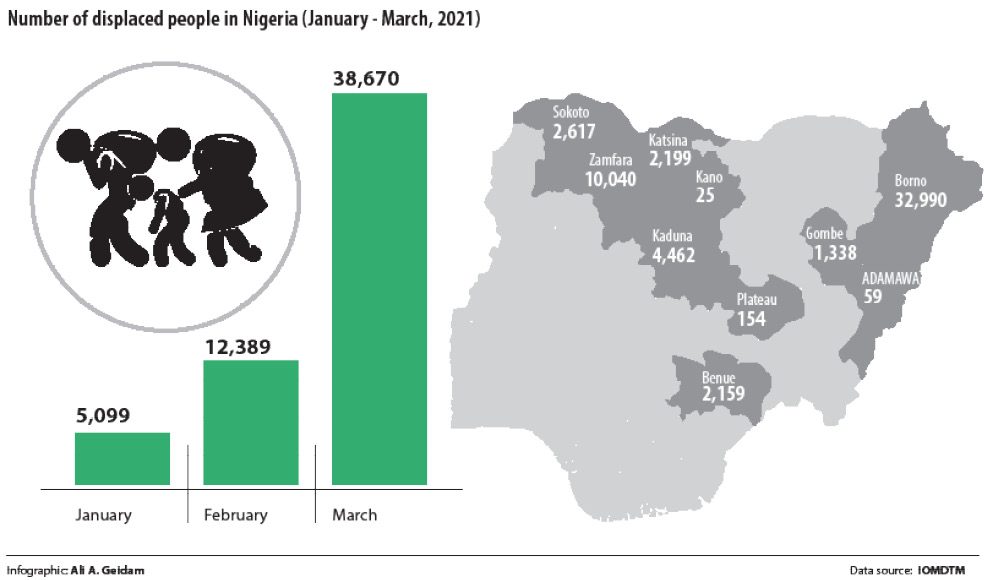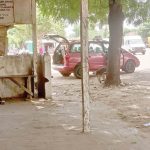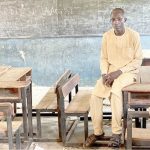At least 56,158 Nigerians were displaced or affected by growing insecurity and other conflicts in 10 northern states of the country within the first three months of the year.
According to the International Organisation for Migration (IOM) Displacement Tracking Matrix compiled by Daily Trust between January and March, the displacements were caused by ongoing violence, growing insecurity, banditry, armed attacks, and non-state armed groups in various local government areas in northern Nigeria.
The IOM is an agency of the United Nations. The Displacement Tracking Matrix (DTM), according to the agency, gathers and analyses data to disseminate critical multi-layered information on the mobility, vulnerabilities, and needs of displaced and mobile populations that enable decision-makers and responders to provide these populations with better context-specific assistance.
The figure compiled is aside other scores of unreported cases of displacement as IOM uses direct observation and a broad network of key informants to gather representative data and collect information on the number, profile and immediate needs of affected populations.
A significant number of those affected were displaced out of fear of future attacks in their communities. Most of the displaced people relocated to uncompleted structures in public schools, uncompleted or/and abandoned houses while others sought shelter with relatives and friends.
President of Lakpma Youth Assembly, Jibrin Abdullahi Allawa, had said over 100 communities in eight wards of Shiroro Local Government Area of Niger State were sacked by bandits.
The increased displacement figures points to growing cases of insecurity in the country that has also led to the loss of hundreds of live
Borno, Zamfara, Kaduna top chart
Among states affected are Benue, Katsina, Zamfara, Kaduna, Kano, Sokoto, Borno, Gombe, Plateau and Adamawa.
The report showed that among the displacements, the highest number of affected people was the occurrence in Kaduna State in March as a result of fear of attacks by bandits in Kwatan Jatau, Kwatan aziri, Guguwa and Angwan Kano villages in Ragasa Ward of Igabi LGA of the state.
The international agency in its March 23, 2021 report said, “Between 13 and 21 March, the fear of attacks by bandits have led to a fresh wave of population displacement. Following these events, a rapid assessment was conducted by Displacement Tracking Matrix (DTM) field staff with the purpose of informing the humanitarian community and government partners, and enable targeted response.”
The report showed that the movement involved 1,010 individuals in 202 households who moved to LEA Primary school located in Rigasa Ward.
In another incident in Zamfara State, approximately 5,260 were affected and or displaced from Bukkuyum Local Government Area of Zamfara State between March 1 and 7, 2021 as a result of attacks and insecurity.
In Borno State, between March 1 and 2, 2021, a Non-State Armed Group (NSAG) carried out an attack in Dikwa LGA, leading to a substantial wave of population displacement.
“The attack in Dikwa LGA affected approximately 27,857 individuals from Dikwa Ward and has caused considerable movement towards Ajiri Ward located in neighbouring Mafa LGA. Other displaced persons fled to other LGAs, including the state’s capital Maiduguri,” the DTM released on March 9, 2021 stated.
A Non-State Armed Group (NSAG) also carried out an attack in Njine Ward of Marte LGA affecting about 3,380 individuals. It caused considerable movement towards the transit camp located in neigbouring Dikwa LGA while other displaced persons fled to other LGAs, including the state’s capital Maiduguri.
In Gombe, according to IOM DTM, approximately 1,338 people were displaced between February 20 and March 4 as a result of communal clashes in Billiri Local Government Area. They fled to the neighbouring Akko, Kaltungo, Balanga and Gombe local government areas.
1,393 people were also affected and or displaced in Gusau LGA of Zamfara State between February 15 and 21 as a result of insecurity and armed attacks.
The UN agency said 164 people were affected or displaced in Guma LGA of Benue State between 1 and 7 February as a result of growing insecurity and armed attacks.
In Kaduna State, 470 people were affected and/or displaced in Birnin Gwari LGA of Kaduna State between January 11 and 17 while 403 people affected and/or displaced between January 18 and 24 in Birnin Gwari, Chikun, Giwa and Igabi LGAs as a result of insecurity and armed attacks.
In Katsina, a resident of Jibia, one of the local government areas mostly affected by banditry, said a number of people were displaced from their homes, adding that some villages were completely deserted while in some cases, a significant number of people migrated to other places.
The source, who happens to be one of the leaders of committees on IDPs in the local government but craved for anonymity, said in most of the villages and hamlets affected, those who stayed back were only there because they have no alternative.
“In Garin Gado, about 80 percent of the population have left, some to Jibia town, others even to some villages across the border in Niger Republic. Also, in Gurbawa hamlets, all of them have deserted the area. Likewise, in Shumfida and Fafara villages, you will discover that a significant number of the people have migrated,” he said.
On their living condition, the source said though the Katsina State Government was doing its best to support them, what they receive is not enough to take care of their needs which they ordinarily meet through farming and other crafts they were used to.
“The state government is doing its best. We have a comprehensive list of those killed and those displaced. And even this week, we have received a trailer and half of grains for distribution to the affected families, but we would love to have a situation in which the victims will return to their homes and continue with their normal lives,” he added.
A displaced resident in Kaduna, Jafaru Abdullahi, said he fled his Anaba village due to insecurity in March. He said he, amongst other residents, relocated to LEA Primary School Birnin Yero along Kaduna/Zaria Highway.
Jafaru Abdullahi said male adults recently returned to the community while female residents are still taking refuge among friends and relatives in Birnin Yero.
“The men returned to Anaba to farm and because it will be easier for us to run when the bandits come,” Abdullahi said.
The Kaduna State Emergency Management Agency (SEMA) said the agency is aware of the displaced people specifically referring to those at the LEA Rigasa.
Executive Secretary of SEMA in Kaduna, Abubakar Hassan, said the agency had visited Rigasa community to see what it could do at the temporary location until the displaced persons were able to return to their communities.
“This happened within nine days and they went back to their communities under the protection of the security agencies. We provided them with food items for the temporary days they spent at the primary school Rigasa. While some actually went back, others moved in to stay with their relations within Rigasa community,” he said.
He said the state government had already given a directive to track, monitor and record persons displaced due to flood, banditry and other factors, and that the displaced Rigasa people were 100 percent captured.
In Kano, residents recounted that in the first week of March 2021, three people were killed and two abducted at Rurum village in Rano Local Government Area of Kano State.
A Rurum resident, Malam Alhassan Ubale, said the coordinated attack was launched in the early hours of the day with the suspected terrorists shooting sporadically and killing three persons, sending many fleeing. The incident, he said, created unrest in the area which made people relocate to other places where they have relatives.
The police in the state also confirmed the incident through the spokesperson Abdullahi Kiyawa, who said the terrorists abducted two people but one of them was rescued by the police. However, the police were silent on those killed.
Also, an official of the Sokoto State Government who pleaded not to be named because he was not authorised to speak, said there were many internally displaced persons in areas affected by banditry in the state.
According to him, the state was also playing host to many people displaced by bandits in Katsina and Zamfara states, as well as victims of Boko Haram some of whom were originally from Sokoto state.
“We have many IDPs camps but it is difficult for me to tell you their numbers or the exact number of the displaced persons because it’s fluctuating.
“The number increases and decreases by the day because some return to their villages and at the same time new people keep coming to the camp.
“But we have IDPs camp even in the metropolis where those displaced by bandits in Katsina, Zamfara as well as victims of insurgency are staying,” he said.
The Manager Humanitarian and Resilience ActionAid Nigeria (AAN), Mr. David Habba, said insecurity is speedily becoming alarming and well-meaning Nigerians must rise up and call on the nation’s leaders to act now.
According to him, the poor suffers when insecurity or crisis occur yet they have no hand in or are the creators of these incidences.
“When Maiduguri was boiling, the rich simply relocated to Abuja and continued with their lives. This is no longer acceptable. We cannot keep quiet. While organisations like ActionAid continue to work hard to ensure that people in distress receive support, we must ensure that people are not distress or displaced. We must nip the slide of the country in a chaos state in the bud. Our leaders must rise up now,” Habba said.
On her part, the West Africa Network for Peacebuilding, Nigeria (WANEP-Nigeria) National Coordinator, Chief Bridget Osakwe, said insecurity causes displacement with attendant effect on development and wellbeing of citizens which impact national development and wellbeing.
“Consequently, there is the need to strengthen capacity to deliver integrated peacebuilding approach starting from early warning and early action structure, improve oversight and protection of citizens; and address natural resources and environment as part of peace making and peacekeeping process,” she said.
Taiwo Adeniyi, Abbas Jimoh (Abuja), Tijjani Ibrahim (Katsina), Mohammed Ibrahim Yaba (Kaduna), Ibrahim Musa Giginyu (Kano) & Abubakar Auwal (Sokoto)

 Join Daily Trust WhatsApp Community For Quick Access To News and Happenings Around You.
Join Daily Trust WhatsApp Community For Quick Access To News and Happenings Around You.


